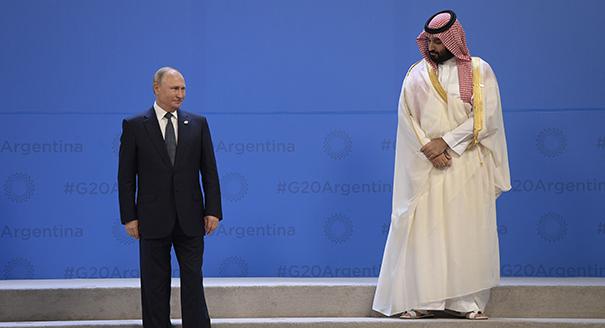One of the most serious economic consequences of the new coronavirus for Russia has been the collapse of oil prices, which at some point dropped to the lowest point in two decades. This situation has had a powerful impact on Moscow’s policies in the Middle East.
Ever since it joined with the Organization for the Petroleum Exporting Countries (OPEC) in 2017 to keep the price of oil stable, Russia has been watching increasingly warily as the niches vacated by OPEC Plus (which includes OPEC, Russia, and other allied oil producers) were filled by American shale producers and others not constrained by agreements over production cuts. When Saudi Arabia insisted on deeper cuts in March 2020, as the coronavirus spread, Russia was incensed by the Saudi “ultimatum” and pushed back, leading to the unraveling of the agreement. Immediately thereafter the Saudis started dumping oil on European markets, and Russia’s budget revenues began to dry up.
The Russia-Saudi Arabia connection has always been testy. The two countries pursue very different objectives in the Middle East. Despite the very public “high five” greeting between President Vladimir Putin and Crown Prince Mohammed bin Salman at the November 2018 G20 summit in Argentina, there is no trust between the two governments. However, the leaderships in Moscow and Riyadh are both wedded to a view of the world based on political realism, which allows for situational agreements based on respective national interests. OPEC Plus was one such agreement, which lasted much longer than anyone had expected. When it crashed, there was a feeling that a big mistake had been made in allowing this to happen, but no bitterness or sense of tragedy. It was only a matter of time, most observers felt, before a new deal would be struck.
The deal came just over a month later, with much prodding from a third party, the United States. President Donald Trump, guided by the concerns of the U.S. shale oil industry, engaged with both Putin and Mohammed bin Salman to move toward an accord embracing all major oil producers. This OPEC Plus Plus agreement established the United States, Saudi Arabia, and Russia as the three main powers deciding on global energy issues. What appeared to many Russians in March as a negotiating blunder promising ultimate defeat, turned into a spectacular geopolitical win. As for the losses resulting from the price war, they amounted to only a fraction of the huge losses wrought by the coronavirus crisis.
Elsewhere, the pandemic has brought a temporary lull in fighting for Syria’s Idlib Governorate, which in late 2019 and early 2020 severely tested relations between Russia and Turkey. The jihadis penned in the enclave protected by Turkish forces have significantly decreased their activities. In Turkey, the coronavirus is spreading fast. There are also fears that the disease will affect the population of Idlib, where many people are huddled together in refugee camps. Iran, another significant player in the region, is gripped by the coronavirus more than most places, and the leadership in Tehran is focused on retaining its power within the country. Under these circumstances, Russia is seeking to consolidate its position in Syria.
Looking ahead, it seems apparent that the coronavirus crisis will not lead to major changes in Russia’s policies toward the Middle East and North Africa. This may appear counterintuitive. As of this writing, the pandemic is only beginning to spread in Russia, receiving the singular attention of the entire Russian leadership. The economic consequences are likely to be very serious. Leading Russian economists and the International Monetary Fund expect the country’s GDP in 2020 to decline by at least 5 percent, and possibly by 8 percent. The Kremlin’s financial resources are going to be strained.
However, Russia’s policies in the Middle East do not require a great deal of spending. The military operation in Syria can be sustained virtually indefinitely at the current level. Turkey has passed the test of the turn-of-the-year crisis with Russia and will continue to be more of a partner than an opponent. The OPEC Plus Plus agreement raises many questions regarding its implementation over the next two years, but it has avoided the worst possible outcome for both Russia and Saudi Arabia. Russia’s diplomatic and quasi-military involvement in Libya will continue, even as Moscow will work toward an acceptable political outcome. Relations with Israel have remained solid, even intimate at the top level, while links with Iran are being maintained at an appreciable level. As for Egypt, it will continue to receive Russia’s special attention as the heart of the Arab world.
As the “coronacrisis” leads the United States to focus even more on itself and European Union member states to display increasingly nationalistic sentiments, Russia’s basic foreign policy approach based on the primacy of national interests will allow it greater freedom to act. As it charts a course, Moscow will continue to combine caution that prevents overextension with bold moves to exploit the opportunities that will doubtless present themselves.








